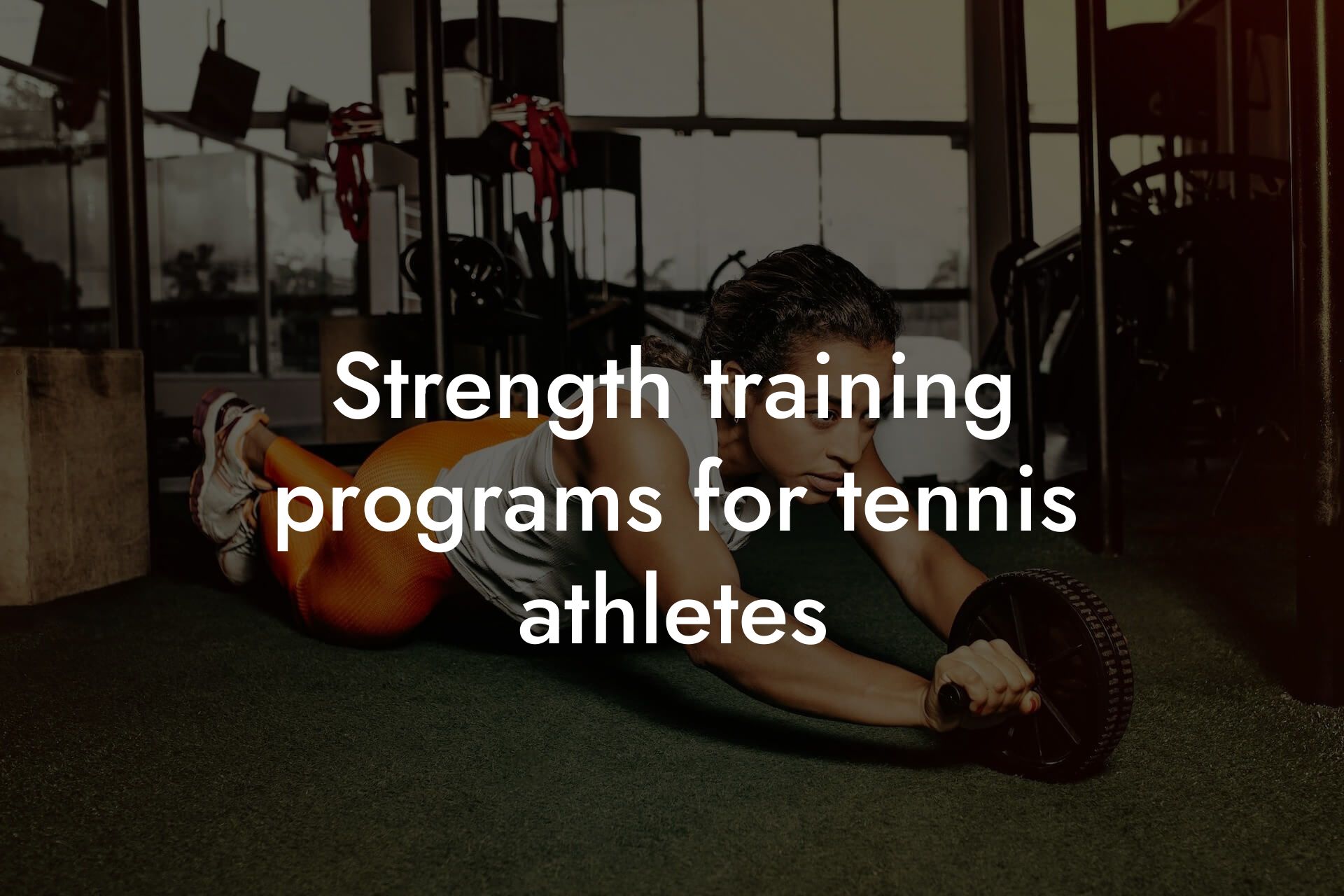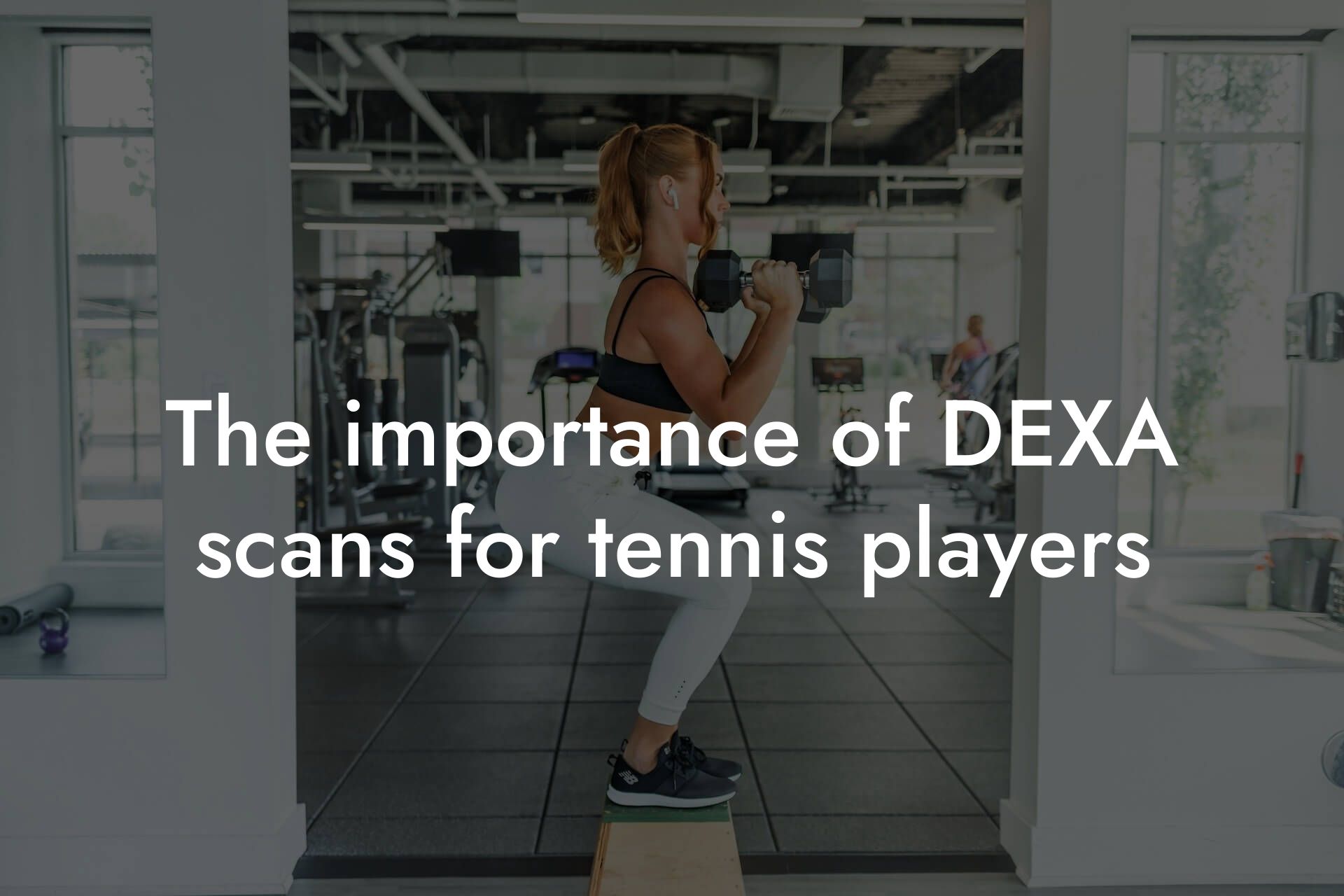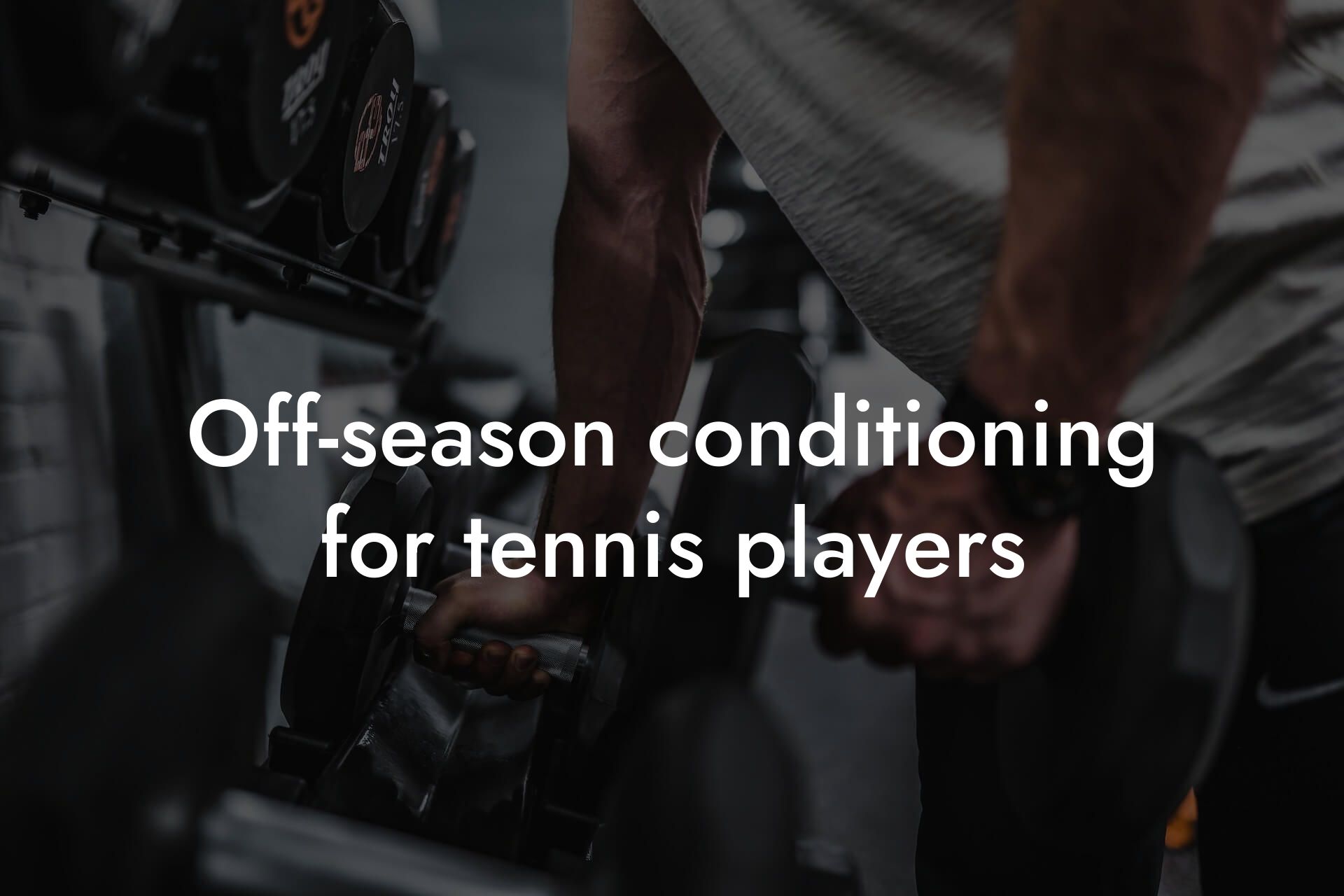As a high-earning professional, you understand the importance of peak physical performance to stay ahead in your game. Tennis, in particular, is a demanding sport that requires sustained energy, agility, and endurance. A well-planned nutrition strategy can make all the difference in your performance on the court. In this article, we'll delve into the essential nutrition strategies to help you maintain your energy levels and dominate your tennis matches.
Table of Contents
- Understanding Energy Needs for Tennis
- Carbohydrate Loading: The Key to Sustained Energy
- Pre-Match Meal: Fueling for Optimal Performance
- Hydration: The Forgotten Component of Energy Production
- In-Match Fueling: Strategic Snacking for Sustained Energy
- Electrolyte Balance: The Key to Preventing Cramping and Fatigue
- Post-Match Recovery: Refueling for Optimal Recovery
- Individualized Nutrition Planning: The Key to Peak Performance
- Frequently Asked Questions
Understanding Energy Needs for Tennis
Tennis is a high-intensity sport that requires rapid bursts of energy, quick movements, and sustained endurance. A tennis match can last anywhere from 1 to 5 hours, with players covering an average distance of 3-5 miles during a singles match. This level of physical exertion demands a significant amount of energy, which can be challenging to maintain throughout the match.
A tennis player's energy needs are primarily fueled by carbohydrates, which provide energy for the muscles. The body's carbohydrate stores are limited, and they can be depleted quickly, leading to fatigue, decreased performance, and increased risk of injury. Therefore, it's crucial to develop a nutrition strategy that ensures adequate carbohydrate intake, optimal hydration, and strategic fueling to maintain energy levels throughout the match.
Carbohydrate Loading: The Key to Sustained Energy
Carbohydrate loading is a nutrition strategy that involves consuming a high amount of carbohydrates in the days leading up to a tennis match. This approach helps to maximize glycogen stores in the muscles and liver, providing a readily available energy source during the match.
Research suggests that carbohydrate loading can improve endurance performance by 10-20%. This is particularly important for tennis players, as it allows them to maintain a high intensity of play throughout the match. Aim to consume 2-3 grams of carbohydrates per kilogram of body weight in the 24-48 hours leading up to the match.
Pre-Match Meal: Fueling for Optimal Performance
The pre-match meal is critical in providing energy for the upcoming match. Aim to consume a meal that is high in carbohydrates, moderate in protein, and low in fat. This meal should be eaten 1-3 hours before the match, allowing for proper digestion and minimizing the risk of gastrointestinal distress.
Examples of suitable pre-match meals include:
- Pasta with tomato sauce and lean protein (e.g., chicken or turkey)
- Whole-grain toast with avocado and eggs
- Oatmeal with banana, honey, and almond milk
Hydration: The Forgotten Component of Energy Production
Proper hydration is essential for energy production, as water plays a critical role in the breakdown of carbohydrates and fats for energy. Dehydration can lead to decreased performance, fatigue, and increased risk of injury.
Aim to drink at least 17-20 ounces of water 2-3 hours before the match, and continue to drink small amounts throughout the match. Sports drinks can also be beneficial in providing electrolytes, particularly in hot and humid conditions.
In-Match Fueling: Strategic Snacking for Sustained Energy
In-match fueling is a crucial aspect of maintaining energy levels during the match. Aim to consume small, frequent snacks that are high in carbohydrates and electrolytes. These snacks should be easy to digest and not cause gastrointestinal distress.
Examples of suitable in-match snacks include:
- Bananas
- Energy gels or chews
- Sports drinks
- Dried fruits (e.g., dates, apricots)
Electrolyte Balance: The Key to Preventing Cramping and Fatigue
Electrolytes, such as sodium, potassium, and magnesium, play a critical role in maintaining proper muscle function and preventing cramping and fatigue. These essential minerals are lost through sweat and must be replenished during the match.
Consuming electrolyte-rich foods and drinks, such as bananas, avocados, and sports drinks, can help maintain electrolyte balance. Additionally, consider incorporating electrolyte supplements or tablets into your in-match fueling strategy.
Post-Match Recovery: Refueling for Optimal Recovery
The post-match recovery period is critical in replenishing energy stores, repairing damaged muscles, and preparing for the next match. Aim to consume a meal or snack that is high in carbohydrates and protein within 30-60 minutes after the match.
Examples of suitable post-match recovery meals or snacks include:
- Chocolate milk and whole-grain crackers
- Protein smoothie with banana and almond milk
- Grilled chicken breast with sweet potato and avocado
Individualized Nutrition Planning: The Key to Peak Performance
Every tennis player is unique, with different nutritional needs and preferences. Developing an individualized nutrition plan can help optimize performance, prevent fatigue, and improve overall health.
Consider consulting with a sports dietitian or nutritionist to develop a personalized nutrition plan tailored to your specific needs and goals. This plan should take into account your energy expenditure, nutritional requirements, and dietary preferences.
Frequently Asked Questions
What are the main factors that affect energy levels during tennis matches?
During tennis matches, energy levels can be affected by several factors, including nutrition, hydration, sleep, stress, and physical conditioning. A well-planned nutrition strategy can help optimize energy levels and improve performance on the court.
Why is it important to fuel my body before a tennis match?
Fueling your body before a tennis match is crucial to ensure you have enough energy to perform at your best. A pre-match meal or snack that includes complex carbohydrates, protein, and healthy fats can help provide sustained energy and prevent fatigue.
What are the best foods to eat before a tennis match?
The best foods to eat before a tennis match are those that are high in complex carbohydrates, moderate in protein, and low in fat and fiber. Examples of suitable foods include whole grain toast with avocado and eggs, oatmeal with banana and honey, or Greek yogurt with berries and nuts.
How long before a tennis match should I eat?
It's recommended to eat a meal or snack 1-3 hours before a tennis match to allow for proper digestion and to prevent gastrointestinal distress during play. Experiment with different timing and foods to find what works best for you.
What are the benefits of consuming carbohydrates during a tennis match?
Consuming carbohydrates during a tennis match can help maintain blood sugar levels, delay fatigue, and improve performance. Carbohydrates are an essential source of energy for the brain and muscles, and can be consumed in the form of sports drinks, energy gels, or snacks like bananas or energy bars.
How much water should I drink during a tennis match?
Aim to drink 17-20 ounces of water 2-3 hours before a tennis match, and 7-10 ounces every 10-15 minutes during play. It's also important to monitor your urine output and color to ensure you're staying hydrated.
What are the signs of dehydration during a tennis match?
Signs of dehydration during a tennis match can include dark yellow or amber-colored urine, dry mouth, fatigue, dizziness, and headaches. If you experience any of these symptoms, stop play and rehydrate as soon as possible.
Can caffeine improve my performance during a tennis match?
Yes, caffeine can improve performance during a tennis match by increasing alertness, focus, and energy. However, be cautious not to consume too much caffeine, as it can lead to jitters, anxiety, and dehydration. Aim for a moderate amount of 100-200mg, equivalent to 1-2 cups of coffee.
What are the best snacks to eat during a tennis match?
The best snacks to eat during a tennis match are those that are easy to digest, high in carbohydrates, and low in fat and fiber. Examples of suitable snacks include bananas, energy bars, energy chews, and dried fruit.
How can I prevent muscle cramps during a tennis match?
Muscle cramps during a tennis match can be prevented by staying hydrated, consuming electrolyte-rich foods and drinks, and maintaining adequate sodium and potassium levels. Consider consuming sports drinks or snacks that contain electrolytes, such as coconut water or energy bars.
What is the importance of post-match nutrition?
Post-match nutrition is crucial for recovery and replenishing energy stores. Consuming a meal or snack that includes carbohydrates and protein within 30-60 minutes after a tennis match can help promote muscle repair, reduce muscle soreness, and prepare your body for the next match.
What are the best foods to eat after a tennis match?
The best foods to eat after a tennis match are those that are high in carbohydrates and protein, and low in fat and fiber. Examples of suitable foods include chocolate milk, smoothies with banana and protein powder, or a meal with grilled chicken, sweet potato, and steamed vegetables.
How can I optimize my nutrition plan for a tennis tournament?
To optimize your nutrition plan for a tennis tournament, focus on consuming a balanced diet that includes complex carbohydrates, lean protein, and healthy fats. Stay hydrated by drinking plenty of water, and consider working with a sports dietitian or nutritionist to develop a personalized nutrition plan.
What are the benefits of working with a sports dietitian or nutritionist?
Working with a sports dietitian or nutritionist can help you develop a personalized nutrition plan that meets your specific needs and goals. They can provide guidance on meal planning, snack selection, and hydration strategies to optimize your performance on the court.
How can I stay fueled during a long tennis match?
To stay fueled during a long tennis match, focus on consuming small, frequent meals or snacks that include complex carbohydrates, protein, and healthy fats. Consider using sports drinks or energy gels to provide an additional source of energy.
What are the risks of not fueling properly during a tennis match?
The risks of not fueling properly during a tennis match can include fatigue, decreased performance, and increased risk of injury. In severe cases, inadequate fueling can lead to dehydration, heat stroke, and other heat-related illnesses.
How can I balance my nutrition needs with my desire to maintain a lean physique?
To balance your nutrition needs with your desire to maintain a lean physique, focus on consuming a balanced diet that includes lean protein, complex carbohydrates, and healthy fats. Avoid restrictive dieting or extreme calorie restriction, as this can negatively impact your performance and overall health.
What are the benefits of periodized nutrition for tennis players?
Periodized nutrition for tennis players involves tailoring your nutrition plan to your specific training and competition schedule. This can help optimize your performance, improve recovery, and reduce the risk of injury or illness.
How can I stay motivated to prioritize nutrition and training?
To stay motivated to prioritize nutrition and training, set specific, measurable, and achievable goals for yourself. Celebrate your successes, and don't be too hard on yourself when you encounter setbacks. Surround yourself with a supportive team, including coaches, trainers, and nutritionists, to help you stay on track.
What are the key takeaways for optimizing nutrition for sustained energy during tennis matches?
The key takeaways for optimizing nutrition for sustained energy during tennis matches include fueling your body with a balanced diet, staying hydrated, consuming carbohydrates and electrolytes during play, and prioritizing post-match nutrition for recovery. Experiment with different foods and strategies to find what works best for you, and consider working with a sports dietitian or nutritionist for personalized guidance.
Here are some related articles you might love...
- Strength training programs for tennis athletes
- The importance of DEXA scans for tennis players
- Off-season conditioning for tennis players
- How to maintain endurance during long tennis matches
- The role of bone density in preventing tennis injuries
- Improving core strength for better tennis strokes
- How body composition impacts tennis agility and speed
- Reducing body fat to enhance tennis performance
- Recovery techniques for tennis professionals
Zak Faulkner
Zak Faulkner is a leading authority in the realm of physical health and body composition analysis, with over 15 years of experience helping professionals optimise their fitness and well-being. As one the experts behind Tano Performance Group, Zak has dedicated his career to providing in-depth, science-backed insights that empower clients to elevate their physical performance and overall health.
With extensive knowledge of DEXA technology, Zak specializes in delivering comprehensive body assessments that offer precise data on body fat, muscle mass, bone density, and overall physique. His expertise enables individuals to make informed decisions and achieve their fitness goals with accuracy and confidence. Zak’s approach is rooted in a deep understanding of human physiology, combined with a passion for helping clients unlock their full potential through personalised strategies.
Over the years, Zak has earned a reputation for his commitment to excellence, precision, and client-focused service. His guidance is trusted by top professionals who demand the best when it comes to their health. Whether advising on fitness programs, nutritional strategies, or long-term wellness plans, Zak Faulkner’s insights are a valuable resource for anyone serious about taking their health and fitness to the next level.
At Tano Performance Group, Zak continues to lead our Content Team revolutionising how professionals approach their physical health, offering unparalleled expertise that drives real results.




